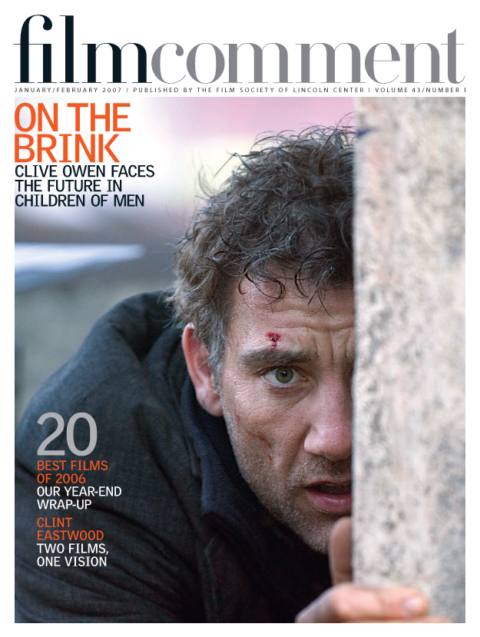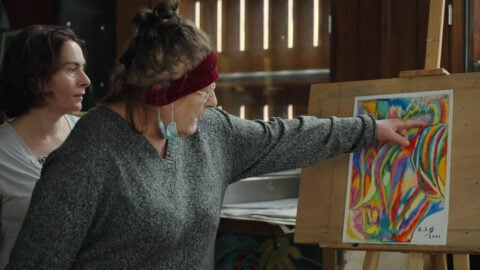Enshrouded in fog morning and night, Thessaloniki, the second largest city in Greece, and one of the oldest in Europe, is a moody, atmospheric locale. But despite its old-time feel and rich history (you can’t walk far without stumbling across ancient ruins, churches, towers, or arches), it is overridingly a bustling city of youth—and students and typically fresh-faced audiences filled the majority of seats during the spirited 47th edition of its annual film festival.
It seemed appropriate then that films populated by characters in their preteens, teens, and early twenties predominated this year’s lineup of 300-plus titles, above all in the top-notch 12-film special section entitled “Teenage Angst/Teenage Lust.”

And while the festival may not have had any certified discoveries featuring people of any age (many of the best films had already played other major European fests), it made the point that surviving adolescence is now harder than ever, and the days of hormonal teen pics, in which virginity-loss is the driving motivation, seem almost obsolete. Now we get the socially conscious teens of Richard Linklater’s Fast Food Nation, who would rather free cows than party—not to mention the Mexican immigrants, who survive by accepting dangerous, soul-destroying work. And in The Crossing, an amateurish yet worthwhile Greek look at illegal-alien travails, a likeable young Bangladeshi flees to Athens, eagerly takes on any odd job that comes his way, but is slapped down time and again, all the way until the tragic finale.
Equally heartbreaking is the nameless protagonist (a captivating Luisa Williams) of Julia Loktev’s Day Night Day Night, which traces the 19-year-old’s preparations to carry out a Times Square suicide bombing in frighteningly up-close visual and aural detail. We don’t ever learn her origins or the source of her motivations, but the film’s still a disquieting reminder that we live in a time when seemingly “normal” teenagers may be anything but.

Even the less politically charged films depicted adolescence in the roughest of forms. 2:37, which owes a great deal to Gus Van Sant’s Elephant, follows seven students—the closeted and outed homosexual guys; the pregnant, bulimic, and invisible girls; the power-hungry rapist; the disabled kid everyone ridicules—through the course of one fateful school day that will close with a suicide. From what we see of the characters’ onscreen lives, the act could have conceivably been committed by any one of them, and this whodunit aspect adds a piercing sense of suspense. The film, made by Australia’s Murali K. Thalluri, still practically a teenager himself, portrays the prevailing cruelty of youth from the vantage point of privilege.
On the flip side is Joshua Dorsey’s The Point, which also spans one day, but focuses on the less fortunate. The title refers to an impoverished section of Montreal, and the kids who live there face a different, more outwardly violent set of hardships, including drug dealers and a murderous sicko cruising the streets. The film’s storylines were adapted from the actual experiences of the teenage cast, who in effect play themselves. And although the nonprofessional acting is sometimes distracting, it also gives the film its edge and awkward honesty.

On a more sinister note, Bugcrush takes the allure of the new-to-school rebel and turns it on its ear. Naïve, geeky Ben is immediately drawn to bad-boy Grant (whose arm bandage is most certainly not obscuring a fresh tattoo), and before the initial delight of potential friendship can wear off, he finds himself in a situation that would seem implausible even in the freakiest of nightmares. Based on this 36-minute debut, director Carter Smith, who’s surely watched his share of Cronenberg, may be on his way to becoming the next big name in horror.
In Retrieval, Wojtek (Antoni Pawlicki, who deservedly won the Best Actor prize) is a mature 19-year-old Pole who more than anything wants to provide for his significantly older Ukranian girlfriend and her young son. But shortly after becoming a debt collector for a local mobster, an ugly world of brutality and greed overtakes him, with devastating effect on those around him. Slawomir Fabicki, who also wrote the hard-as-nails script, took home the prize for Best Director.
“People are crazy to have children these days,” a potential employer tells Esma, a Bosnian woman transplanted to Sarajevo, in writer-director Jasmila Zbanic’s Grbavica. Though in her case it wasn’t her choice: 11 years ago she was raped—and now her rebellious daughter is forced to reconcile herself to the fact that her father is not the brave war hero she believed him to be. Mirjana Karanovi as the single mother who struggles to provide unconditional love to a child who’s a constant reminder of an incident she’d rather forget, gives one of the fest’s most authentic and moving performances.

Times and Winds is a beautiful, slightly off-kilter film, full of long tracking shots of kids wandering aimlessly through their mountain village in Turkey. (Like Grbavica, it was shown as part of the generally riveting Balkan Survey.) Bordering on puberty, these youngsters cope with all the usual crushes and curiosities, but must also come to terms with parents who are ineffectual and futures that hold little promise: sadly, they seem destined to become just like their elders.
The young girl in Argentine director Pablo Trapero’s painful yet always compelling Born and Bred will never reach her troubled teens: she is killed in an automobile accident at age nine. The movie details her father’s withdrawal from society—quite literally, as he takes himself off to the barren Patagonian wilderness, where he tries to sort out his near-crippling feelings of pain and guilt (he was the driver of the car). Based on everything we’ve seen during the festival, perhaps she’s the lucky one.
<br>
Finally, the one film, totally off the teen theme, and too utterly insane and gloriously vile not to be mentioned is Taxidermia. For those with an iron stomach, György Pálfi’s follow-up to his ultra-inventive yet light by comparison Hukkle (02), was the fest’s high watermark, or, at the very least, one of its most memorable events. Considering its extreme nastiness—it overflows with sexual perversity, dismemberment, gut spilling, and more vomit than Stand By Me and The Meaning of Life combined—it’s telling that there wasn’t a single walkout. Strikingly original, wickedly funny, and stunningly shot and directed, the film traces three generations of men—a demented World War II aide-de-camp, an obese competitive eater, and a scrawny taxidermist—from a family that redefines the word “doomed.” Like the festival itself, this was one experience that won’t be forgotten anytime soon.








